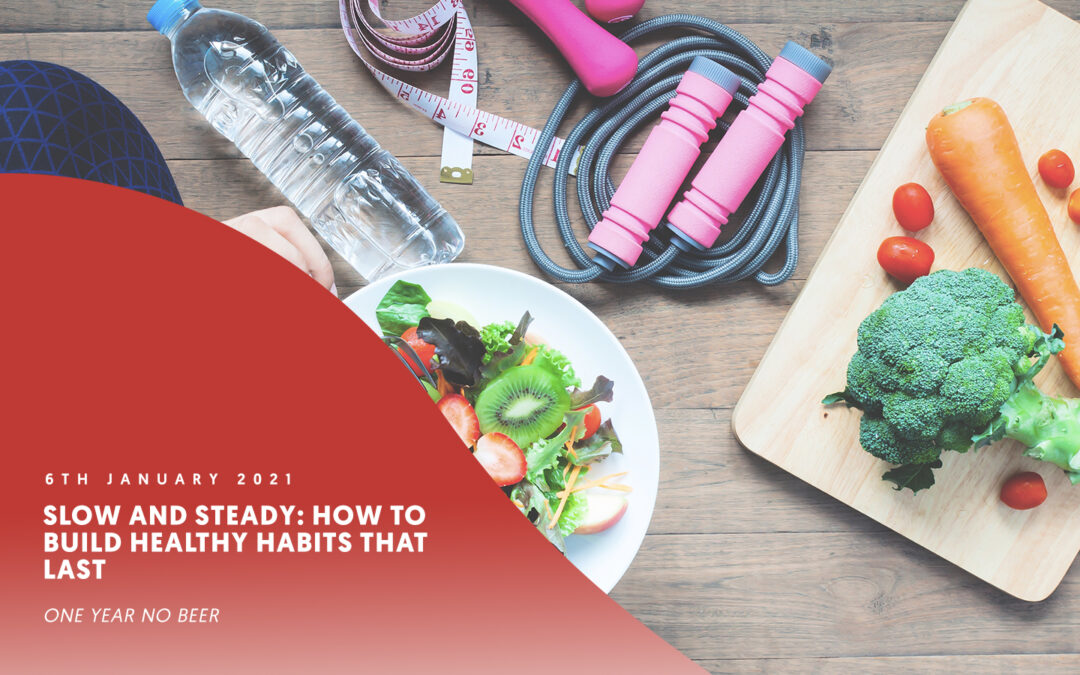You may have heard the phrase ‘slow and steady wins the race’, and well, this too is true for approaching building healthy habits and behaviour change.
It is that time of year again when seemingly everyone has set themselves the challenge to achieve an impressive goal, or aims to flip an unhealthy habit on its head. And while we agree, a new year offers a clean break and a fresh slate to start creating some healthier habits, we suggest a more incremental approach that is more likely to last you to the end of the year.
It is admirable to try to change your entire life in one go, but unfortunately for most people, this is unrealistic and plans tend to falter within a few weeks. There can be a number of reasons as to why this is, from biting off more than you can chew, to not being specific enough about the goal you want to achieve. Instead, it is important to set out clear objectives, milestones and take the time required to fully cement new habits before moving onto the next goal if you want your New Year’s resolutions to last.
Tips for creating habits that last:
- Choose one area to focus on at a time
- Take the time to cement the change before moving onto your next goal
- Set yourself specific goals and milestones
How does habit change work?
Imagine yourself standing in a forest, and in front of you there is a well trodden pathway. You decide to go off piste, and walk to the undergrowth. The more times you walk this route through the undergrowth – while tricky to navigate at first – the more established the new pathway becomes over time. And likewise, the less the old pathway is used, the more it is slowly forgotten, as the forest and plants reclaim it.
This is how the neural pathways in your brain can be retrained, and you can replace an old behaviour with a new one. However, imagine you are trying to change lots of habits at once, and you are running in all directions through this forest. It is much harder to dedicate the time to each individual path in order to establish the new walkway. This is why it is a good idea to take on behaviour change goals one at a time, and focus on them until they come naturally.
It’s a marathon, not a sprint!
Another common phrase we can commandeer for behaviour change – and while it isn’t the most exciting advice, it is so important to keep in mind when creating long term habit change. It takes time to redirect the automatic responses in your brain – this is not a process you can rush! According to research, on average, it takes 66 days for a behaviour to become automatic. And this can vary from person to person, with results showing it could even take up to 250 days for some!
80% of New Year’s resolutions fail by the second week in February – and whether this is due to underestimating how hard it can be to change your behaviour in the long term, or because not enough specific focus was paid to making one particular change, this is not the outcome anyone hopes for when setting out to make healthier choices. So take it slow. Pick one area you’d like to focus on, and play the long game. Before you know it, you won’t even have to think about it!
Be specific!
This leads us onto our next word of advice when setting yourself your resolutions for the year ahead. Be as specific as you can in your goal setting. And we mean specific! If you set yourself the goal to ‘eat better’ or to ‘drink less coffee’, the ambiguity of these goals can lead to bending of the rules and leeway when faced with cravings or triggers. Instead, set yourself specific boundaries, such as ‘I will eat five bits of fruit and veg per day’, or ‘I will aim to walk 5,000 steps before work each morning’. Once you have tackled one of these goals and you feel comfortable and ready to take on your next challenge, you can set yourself another specific goal and begin to build up to the healthier lifestyle you want.
The world is your oyster
Okay, okay – sorry – that is our last catch phrase! But it is true, by making little changes and allowing them to permeate into your everyday life, you can slowly build a series of new healthier habits that allow you to live your life that little bit better. And we promise, it is addictive! Once you have overcome your first challenge, you can’t wait to dig into your next self-development goal.
If you’re not too sure where to start, and you haven’t joined us for a challenge already, why not get started with our 5-Day Free Challenge?



An entrepreneur and former senior oil broker, Ruari gave up drinking after excessive consumption almost cost him his marriage, and worse, his life. Going alcohol-free improved his relationships, career and energy levels, leading to him founding OYNB to provide a support network for others.







